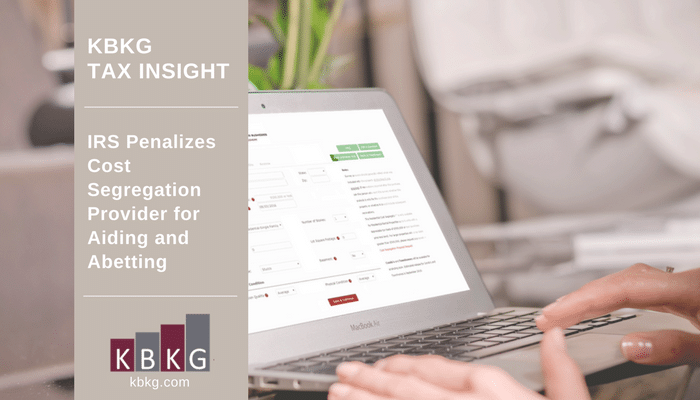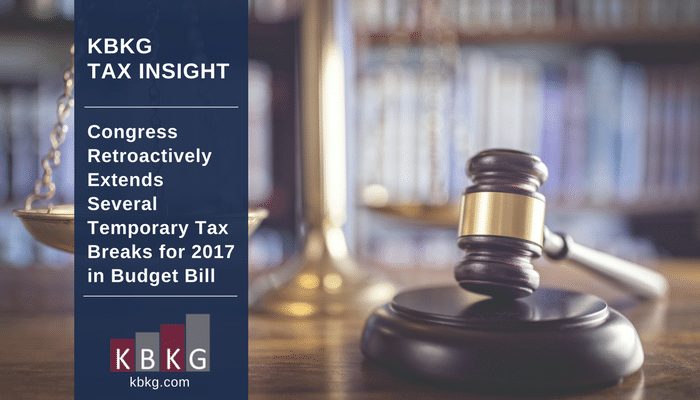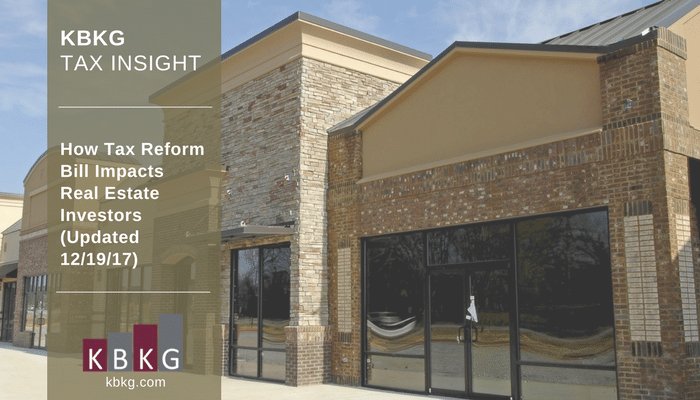The 179D energy efficiency tax deduction has been extended retroactively for improvements completed by the end of 2017. This financial incentive is geared towards: 1) building owners (commercial or multifamily), 2) tenants making improvements, and 3) architects, engineers, and other designers of government buildings. The tax deduction is worth up to $5.00 / square foot … Read More
Tax Insight
KBKG Tax Insight: IRS Penalizes Cost Segregation Provider for Aiding and Abetting
Tax preparers and their clients often cannot recognize quality differences among cost segregation service providers, leading to buying decisions based on who proposes the lowest fee or promises the highest tax benefit. However, the real test of quality is how the cost segregation results stand up in an IRS audit. What are the consequences of … Read More
45L: The Energy Efficient Home Credit – Extended through 2017
Homebuilders and multi-family developers have a unique opportunity to capitalize on an energy efficient home credit that is often overlooked. Low-rise apartment developers and homebuilders are eligible for a $2,000 tax credit for each new or rehabbed energy efficient dwelling unit that is first leased or sold by the end of 2017. Taxpayers also have … Read More
KBKG Tax Insight: Congress Retroactively Extends Temporary Tax Breaks for 2017 in Budget Bill
President Trump just signed and enacted a 2-year budget bill that extends government funding through March 23 and also retroactively extends numerous tax breaks that had previously expired. The majority of the tax extenders included in the bill are renewed for one year through the end of 2017. Among these tax breaks are various provisions … Read More
Tax Insight: How to Co-ordinate Cost Segregation with Like-kind Exchange
The Tax Cuts and Jobs Act (TCJA) was signed by the President on December 22, 2017. The TCJA is the most significant overhaul of Internal Revenue Tax code since the 1986 Tax Act under President Reagan. The Committee Report has over a thousand pages of modifications to many areas of the tax code. One piece … Read More
KBKG Tax Insight: Avoid Common R&D Expense Documentation Errors
Business owners are often surprised to learn they may be able to claim the Research & Development (R&D) tax credit. The credit was originally created as way to encourage American companies to conduct R&D activities domestically. While initially thought to apply to large companies with formal R&D departments, “smaller businesses” in a wide range of … Read More
Minimize Gains on Sale of Condos in Mixed-Use Developments. Condo Tax Basis Allocation Studies
Traditional cost accounting for mixed-use residential projects often does not properly allocate all construction costs to each section of the property. Consequently, there may be a significant understatement of cost basis for residential condominium units resulting in higher taxable gains upon sale. This is most common within vertical mixed-use developments where residential condos are stacked … Read More
KBKG Tax Insight: Tax Reform & The R&D Tax Credit
It’s been over thirty years since the tax code has been modified to this extent. It has been a talking point for politicians since the Reagan administration brokered the bipartisan Tax Reform Act of 1986. However, the divide between the political parties have kept it a talking point since then, until now. The Tax Cuts … Read More
KBKG Tax Insight: How Tax Reform Bill Impacts Real Estate Investors (Updated 12/19/2017)
For the most up-to-date information on Qualified Improvement Property, see our latest post. On December 15, the conference report for the Tax Cuts and Jobs Act was released and reconciles several key differences for real estate owners between the proposed House and Senate bills (discussed in KBKG’s previous Tax Insight dated November 10, 2017). The … Read More
KBKG Tax Insight: The Effects of Tax Reform on R&D and Orphan Drug Tax Credits
The Senate on December 2, 2017, passed its version of the Tax Cuts and Jobs Act (TCJA) by a vote of 51-49. This is another key step toward passage of this comprehensive tax legislation by year-end. However, the final Senate bill continues to differ from the tax bill passed by the House in mid-November. Although … Read More









